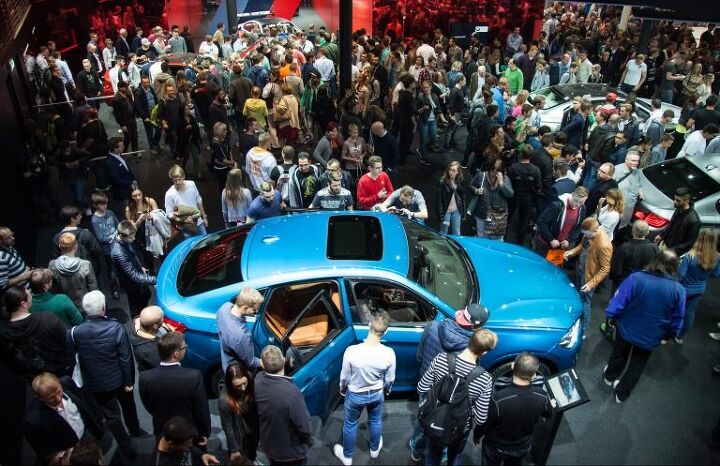#vda
European Automakers Think Fuel Taxes Will Increase EV Sales
Undoubtedly eager to improve the take rate of electric vehicles, automakers have a myriad of solutions at their disposal. But the majority have something to do with getting the government involved to futz around with taxes.
Normally, this has to do with making special exceptions for EVs or subsidizing them via rebate programs. But governments seem happy to do this, as increasingly more legislation is advanced that would place restrictions on when and where people will be able to drive internal combustion vehicles, and automakers appear to be getting with the program. We’ve already seen manufacturers choosing sides in America’s gas war and now the Europeans are getting in on the action by demanding higher taxes be imposed on vehicles reliant on gasoline or diesel.
German Auto Lobby Wants Biden to Eliminate U.S. Trade Restrictions
Germany is eager to see the United States abolish trade barriers implemented by President Donald Trump now that it looks like Joe Biden has won the 2020 election. While that could all be undone by the sudden influx of legal actions taken by the Trump campaign as presumptive evidence of election impropriety streams in, Germany would still like to get the ball rolling on trade with the Democrats.
The nation’s automotive industry is petitioning leadership in the U.S. and European Union to align technical/regulatory standards and minimize the existing trade barriers. The German Association of the Automotive Industry (Verband der Automobilindustrie) or VDA has already endorsed the proposal with the lobby group’s president confirming its position in a recent webcast hosted by the Frankfurt business media club ICFW (Internationale Club Frankfurter Wirtschaftsjournalisten).
Frankfurt Auto Show No Longer in Frankfurt
Verband der Automobilindustrie (VDA), the organizing body of Germany’s International Automobile Exhibition (IAA), has announced it will no longer hold its bi-annual trade show in Frankfurt. Last week, representatives from Berlin, Cologne, Frankfurt, Hamburg, Hanover, Munich and Stuttgart met with VDA to present their concepts for IAA 2021.
Frankfurt has already been taken out of the running, with the group saying the event would no longer take place at the Frankfurt am Main trade fair location after “evaluating all relevant criteria.” Despite being home to the show for decades, attendance has waned, encouraging VDA to examine its options.
Other trade events have undertaken similar changes in an effort to promote turnout amid growing public disinterest. Detroit managed to keep the North American International Auto Show (NAIAS) from leaving town, shifting its timing from January to June. Officially, this was done to allow more opportunities for manufacturers to set up outdoor displays and on-road vehicle demonstrations.
But simply having it take place at a time when Michigan air isn’t bitingly cold is bound to encourage more people to turn up.
The Cost of Future-proofing: German Auto Industry to Invest $68 Billion Into EVs, Mobility, Data Over Next Three Years
The German Association of the Automotive Industry, known in its native tongue as Verband der Automobilindustrie (VDA), says its members have formally committed themselves to investing 60 billion euros (roughly $68 billion USD) into electrification and vehicular autonomy over the next three years.
The claim was made as part of a larger announcement serving as a rundown for what German automakers hope to achieve in a period where nothing seems certain.
The European Union, along with China and several other nations, have committed themselves to embracing electrification in a bid to lower emissions and modernize roadways. “In the next three years, we will invest over 40 billion euros in electric mobility, in addition to a further 18 billion euros for digitalization, and the development of networked or automated vehicles” said VDA President Bernhard Mattes, adding that German automakers anticipate 100 EV models on offer to the public by the end of that period.
Automakers Understandably Freaking Out Over 'No Deal' Brexit
With Britain’s parliament rejecting Prime Minister Theresa May’s latest Brexit deal, European automakers stand to face some strong headwinds in the near future. As of now, no clear path lies ahead. Many believe the European Union will continue playing hardball, punishing Britain for leaving. But, even if it doesn’t, loads of regulatory and trade issues must be resolved in short order to avoid problems.
There’s also no shortage of hyperbole surrounding the issue. Just this morning I heard cable news call it “the largest crisis in Britain’s history,” as if World War II never happened. A channel away, another outlet proclaimed how splendid it would be for trade between the United Kingdom and United States.
Regardless of which side of the fence you fall, there’s more at stake here than Theresa May’s job. Automakers, who like consistency above all else, worry a no deal plan for “British independence” could be tantamount to flipping the industry table. They don’t like being caught up in the uncertainty surrounding Brexit, and there appears to be an endless list of issues to contend with.
European Union May Not Be Unified On Emission Regulations After All
With California and the Trump administration squabbling over vehicle emissions, it’s easy to assume that Europe’s green initiatives are progressing trouble free. In truth, things are a little more complicated. Europe has come together to endorse tougher emissions rules but one of its member states appears to be reaching its breaking point. Unsurprisingly, it’s the one that builds the most automobiles.
Earlier in the week, EU environment ministers announced a need for countries to decide on reduction targets for the foreseeable future. Germany has endorsed a proposed target for a 30-percent reduction by 2030, compared to 2021 levels. However, France and several other nations are pushing for a stricter 40-percent limit while Austria wants to see 35-percent reductions. Although, the most interesting thing about this is how closely Deutschland’s arguments for softer standards are to America’s.
U.S. Gives German Auto Industry Zero-tariff Proposal, Merkel Receptive
The fresh threat of new automotive and parts tariffs from the United States has everyone up in arms. We recently published an exhaustive list of comments manufacturers and local governments made to the U.S. Commerce Department. They, along with suppliers, universally despise the idea and are doing everything in their power to convince the Trump administration to reconsider. Many are even discussing the grim prospect of layoffs and suspending investments.
However, the president remained firm on doing whatever it takes to bolster domestic production and U.S. automotive exports while the world tried to make sense of his strategy. Was this a madman playing hardball and gambling with the industry’s future, or the work of a master dealmaker forcing others to come to the table? Perhaps a little of both?
Earlier this week, the U.S. ambassador to Germany told German car executives that President Donald Trump would suspend threats to impose tariffs on cars imported from the European Union if the European Union lifts duties on U.S. cars. But the wildest part of all of this is that both the automakers and the German government seem to be in support of it.






















Recent Comments